Four Scenarios of Trust
Outlook for Life in 2030
In the future of trust, we possess the ability to choose which type of trust to build with the people around us, responding to the type of relationship we want and the context of a given situation. It is not a matter of choosing one of the four trusts, but rather fluidly choosing which one based on the situation at hand.
We’d like to establish now that when we say the word ‘trust’, we inherently imply relationship, as trust ultimately reflects the interactions between people and context.
The stories that follow depict each trust in four parts, establishing an example for how relationships function in each quadrant and the principles that guide them. Each story covers situations that feature types of trust between individuals, the behaviors that go with it, the technology that supports it and finally, the values people receive as a result. As you read through the four trusts and learn about these new relationships, try to imagine how these might play out in your own life and with the people you know.
By observing the role of trust in our lives now, we hope to reimagine the role of trust in the future.
01/ Grow
We select only the info we wish to share in order to present our ideal selves to an open crowd. No longer possessing a single appearance of ourselves, we flexibly build trusting relationships with a variety of people through individually crafted personalities that evolve over time.

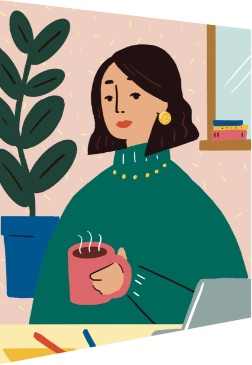
Tangible Benefits
Yui is a long-time art book lover. As an illustrator, she loves qualities such as the feeling of the paper, the quality of the binding, and the scent of freshly printed ink. One of her crafted personas focuses on all things books: bookstores, reading cafes, art fairs, and print shops. She chose to segment this part of herself as a stand-alone identity because it’s always been a personal passion of hers enjoyed in isolation, a habit she picked up wandering around London alone from bookstore to bookstore. She only wants to share this part of herself with other hobbyists and retailers, in order to still grow her passion but not mix it with her professional life.
On a weekend, Yui enters a bookstore and is excited to discover the curation of books featuring new authors unknown to her. Her crafted persona shared in advance reveals all the books in her library, her past shopping history, schedule and location data for when she usually goes shopping, and other preferences. Because she shared this specific persona with the retailer, along with other individuals, the curator of the bookstore responds and adapts to her needs in real time. Understanding her shopping habits, what topics most intrigue people like her, and analyzing trends from other users, the curator engages Yui with serendipity, and every time she shops there she has a wonderful conversation. This open relationship with the retailer and other hobbyists exchanges only the most relevant information, using it all to benefit her experience.

Emotional Interpretation
Another one of Yui’s crafted identities revolves around fashion. Attending small pop-up shops and local shops throughout the year under a designer persona, Yui uses her design skills to craft handmade clothing, patterns, and textiles to sell to a growing fan base. When engaging with buyers, money is sent to her main bank account, but through an alternate route, preserving her privacy. Being able to craft multiple trusted selves means segmenting the part of herself Yui wants to hide, all while getting tangible benefit from the pieces she does decide to share, without fear of overexposure.
Yui shapes how her data presents itself to others, sorting and codifying what is relevant and what isn’t. The places, engagements, and interactions she experiences out in the world are captured and shared with her before anyone else, for her to attribute to any of her personas as she sees fit.
Contextualizing the raw data collected of her experiences and interactions in the world, allows her to capture only the most relevant and meaningful moments. This relationship formed between those that collect data, like her customers, the retail stores, and city at large, provides peace of mind that her multi-identities are honest and validated by trusted partners, yet only applicable when necessary and at Yui’s discretion. Information such as where she’s been, what she did, and who she sold to all gets tracked and embedded into her digital self at her judgement.
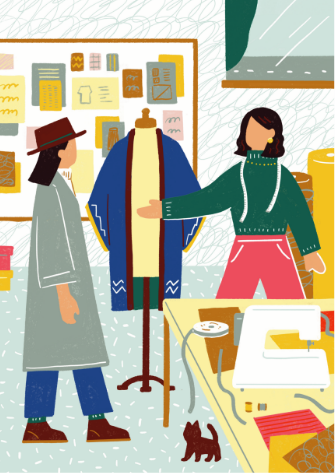
Global Citizenship
After gaining more clients and deciding to leave her job to go freelance full time, Yui spends significantly more time in the UK, where her connections and relationships from her college years support her business. She feels comfortable living and working in both places, as certain aspects of her identity span the globe. From getting a bank account in one country or a vaccine in another, everything is tracked, shared, and trusted across localities, creating an entirely new persona shareable with any new client, no matter where she works.
Yui is very much a global citizen now. She adds her driver’s license from the UK to her new global profile, allowing her to seamlessly transition to driving in Japan after a quick traffic rule test about the local differences. Or when she receives a prescription in Japan after a bad sinus infection, other countries can authenticate her official identity and adapt to her lifestyle.
In order for her to maintain all her identities, trust means absolute faith in the digital backend systems that allow this to function globally, and the government partnerships allowing for people like Yui take ownership of their multiple selves like never before.
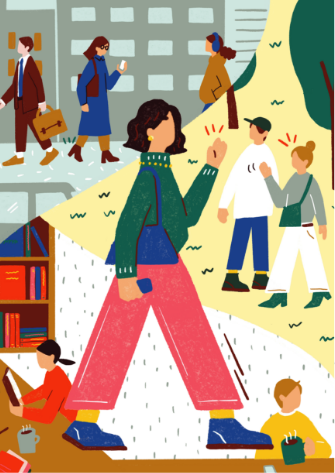
As someone with a very segmented background, Yui manages a complex web of interpersonal relationships on a daily basis. Despite being a natively born Japanese citizen, Yui’s time abroad sometimes makes her feel separate, and changes the way she behaves and the expectations others prescribe to her in certain situations. With all of her hobbies and interests, however, Yui is eager to expose herself to new experiences and craves surprise and discovery but without expectation and judgement.
The multitude of personalities that exist within her take the shape of distinct user profiles, acting as different versions of herself that cater to specific groups of people and in different contexts. These profiles are open and honest, but only reveal a partial fragment of who Yui is as a whole. Her information no longer anonymously collects without her consent, with interpretation done by a backend system. Transparency in how her online and offline actions impact her relationships is an important aspect of how she builds trust with other people. Yui expends greater agency over designing these multiple personas in order to participate comfortably with any group, trusting others only hold access to the specific parts of her identity she wants them to see. Learning to engage, interpret and communicate data about herself emerges as an important step in how she interacts with the physical world. The whole picture of Yui may not be clear to others, but what is visible is authentic, originating from Yui herself.


02/ Predict
All information about an individual is freely accessible and public for all. Treated like a public utility, open data lowers the barrier to starting relationships with the unknown by perceiving trust in a utilitarian manner. This approach fosters greater connection to our immediate surroundings and society at large.

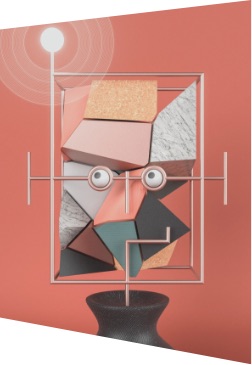
Lowering Barriers
For Yosuke, his neighbors are different from his friends, family, and other people he knows. He trusts they are there for him if something were to happen and when he needs immediate help, whether an illness, crime, or natural disaster. As someone new to the city, accessing public information about people in his immediate context factored heavily into his choice of location.
This transparency of data allows him to connect with anyone living nearby, such as when a last minute work responsibility leaves him in need of a babysitter for his daughter Kaori. He checks the schedules and profiles of people in his apartment building and makes arrangements with a retired school teacher named Miyoko to watch his daughter for the evening. With the unquestionabl nature of trust built into openly accessible data for all, he feels confident reaching out to strangers. Yosuke teaches his daughter that if she is ever in need, to look up the information of people living nearby. He knows lack of trust can potentially keep him and his daughter stuck within their established biases. Open data provides the opportunity to tackle the unknown with confidence and safety, building stronger connections with any community.
For Yosuke, trust is as simple as getting to know a new neighbor, and understanding that starting with a single commonality such as a neighborhood, sets the stage for emergent relationships between him and the people around him. The older generation was taught to be wary of strangers, but he is happy his daughter does not have to grow up feeling this way.
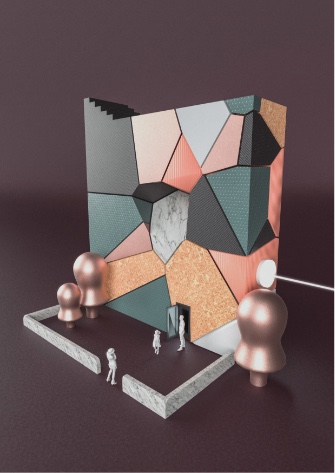
Contextual Transparency
From the small local shop down the street to the giant mall at the train station, Yosuke has access to any and every piece of contextual information he could hope for. A particularly useful set of information is from his local grocery store, where he can access dynamic stock lists and when items become available. As his daughter walks home from school, she remembers her dad asking her to pick up some fruit for dinner as a notification setup to automatically go off pings her watch once her location data leaves the school grounds.
On her way, Kaori checks what other special snacks the grocery store stocks, how much they will cost, and how many people are in the store right now, in order to avoid crowds. She grabs the groceries, all dynamically priced based on supply and demand, and leaves the store, payment done automatically via payment details associated with Kaori’s identity.
A bit later, Yosuke starts to get worried because Kaori is taking longer than expected to return home, so he checks her location and logs into a nearby camera, all open and accessible to the public, and finds Kaori distracted, reading a book while munching on some persimmon on a bench out front.
Kaori’s data and experience, along with the people and places around her, are gathered in service of public good, giving democratic access for individuals like Yosuke to make more informed decisions about how to live, and who to trust.
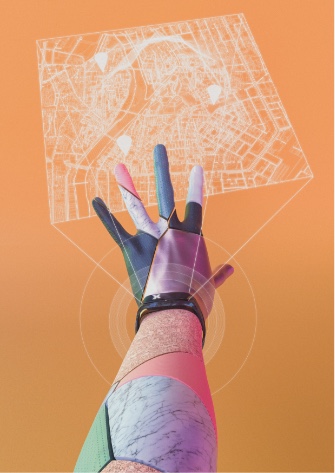
Growing Locality
Being able to openly access any local information permits Yosuke a renewed focus on his immediate context. Being connected and able to trust the decisions and actions of local leaders with full transparency improves Yosuke’s overall trust in government, as any decision that directly affects him and his family is automatically communicated. As a resident, he easily accesses where local government funds enhance the neighborhood, and how certain policies impact his day to day.
As the system grows, it responds by addressing the recent rise in families moving into the community, understanding that capacity is reaching its limits. It informs Yosuke that a new play area has been ordered based on analyzing the usage data of existing parks, a desire already in his mind after spending time at a crowded park with Kaori the past weekend.
The decision to participate in local elections, voting on community leaders and bringing up personal struggles, such as his desire for new playground equipment at the park down the street, is an easy and essential part of living in a local community when data is openly available because processes and decision-making are more transparent.
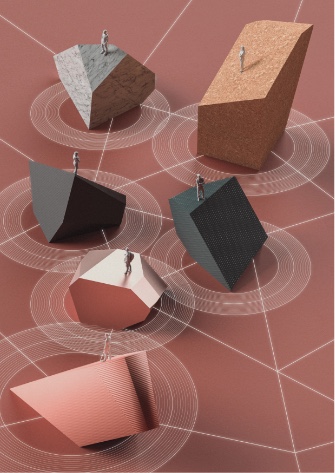
The systems and services that support Yosuke and his lifestyle are incredibly sophisticated. Due to the sheer quantity of information publicly accessible, artificial intelligence becomes much more predictive in anticipating his needs.
When Yosuke provides personal filters and perspectives that are important to him, the big one being his desire to provide a better life for his daughter, the system responds with hyper flexible and dynamic relationship building between him and the city, in order to better align with his desired lifestyle. By opening himself up to the city, he creates a way of interacting with big data that is more personal.
By investing in his immediate neighborhood Yosuke trusts his community to build a stronger and more capable collection of people that can weather any storm. One of the main reasons Yosuke moved here in the first place was due to the openly shared values of the neighborhood and the initiatives in place by the local leaders, communicated to him prior to his arrival. These transparent and trusted intentions allow him to get the most out of where he lives.
More data allows us to provide better support before we even know we need it, and problems are addressed before they become problems.


03/ Achieve
There is a strong and common goal people connect with in order to establish a very specific,outcome-based relationship. Excessive intimacy is not sought out with others and trust revolves around the ability to adhere to commitments within a closed community.

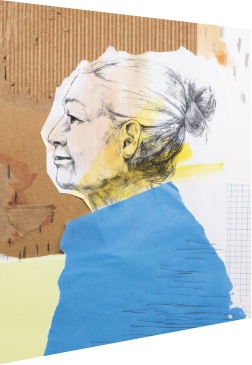
Democratized Opportunity
Living alone outside Fukuoka, Risako is a retired ex-marketing director keenly interested in plant based diets, sustainability, and all things healthy living. As a previous full time office worker, she worked long hours and ate poorly, sacrificing her health in order to make important deadlines. This lifestyle led to chronic health issues, which Risako addressed through a major lifestyle change to her diet and behavior.
Now in retirement, Risako wants to learn more about this newfound lifestyle of hers, and get involved in helping working people lead healthier lives. She does research and joins various online and offline communities, all dedicated to this shared goal of healthy living, where she chats with other people, reads articles, and expands her thinking. Here she discovers great new recipes for meals using clean ingredients, new farming methods practiced by sustainable agriculture groups, and new community engagement strategies.
As a guest in these communities, Risako engages with a variety of people, engaging only as much as necessary to satisfy their shared interests. The relationships between her and these communities operate under an outcome-based model, where trust is built around contribution, not on who they are or how they behave beyond.
For Risako, this arrangement is exactly what she needs to bolster her interests, as education and learning can decouple from previously discriminatory biases, such as her gender, age, or ethnicity, and everyone operates with the same expectations. By only sharing what is absolutely necessary, opportunities democratize for those like Risako, eager to divorce their goals from their personal lives.

Filling Gaps
As she learns more and more about her new found passion for plant-based food, Risako starts to reach out to trusted experts in the field, including chefs, food scientists and farmers.
While meeting with a local farmer and getting to know their beliefs, Risako takes extensive notes, compiling research, personal opinions and topics of interest, gradually collecting an extensive personal database over time. Risako relies on AI and a machine learning tool to parse her approach and fill in gaps, making sure the information she receives is accurate and no major pieces are missing from the full picture of a given topic.
As she writes about farming methods, the AI alerts her about other articles already written, and fact checks her statements with verified information online. Here she is able to put trust in her own perspective, building an approach and point of view that goes deeper than individual opinion and backed up by facts. Getting the whole picture is of major importance when dealing with closed communities as it’s easy to only engage with one particular point of view. Risako takes care to analyze the information she receives and expand if necessary.
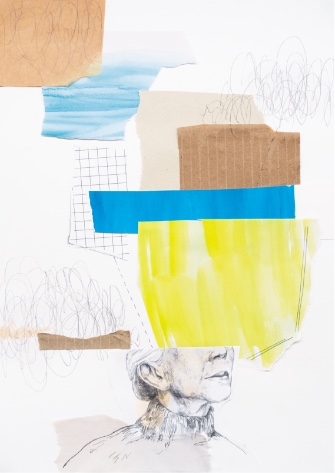
Targeted Harvesting
Through her networks, Risako starts to build connections with companies looking to better understand their employees’ health and use the workplace to help them lead healthier lifestyles. Only requesting specific information, Risako engages the data of a particular client named Kentaro in only the desired way.
Kentaro’s relationship with Risako and his personal data creates a sense of comfort in an otherwise vulnerable environment because only discrete moments are visible. Connected products provide Kentaro peace of mind by laying bare only specific aspects of his life. The smart products Kentaro uses on a daily basis from the home to the office, monitor and anonymize his health data and share it automatically with Risako, tracking markers of diet and sleep as well as detecting warning signs such as elevated temperature and blood pressure.
Only requesting the necessary information, Risako utilizes an ecosystem of data collected between all the products Kentaro interacts with around the specific nutrition goal he is trying to manage. Not all information is extracted, just what is needed to achieve their shared goal.
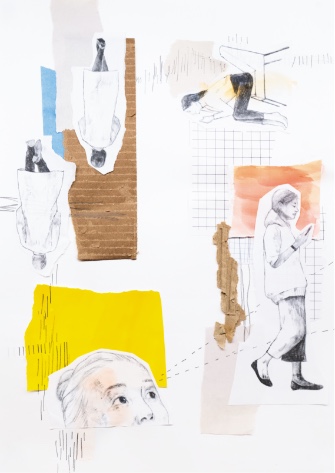
By only engaging and associating with the people Risako trust’s, she creates curated relationships of her own based on personal standards of how she views participation in her community and with society at large. When trust lies in shared values between a smaller group of individuals, opportunity arises in designing how you move from one closed circle to another, and how you engage with people outside.
As her expertise grows, Risako starts building a community of her own around her approach to food and cooking made up of office workers and companies looking to make the same lifestyle change she did. Regardless of her expertise, clearly and accurately communicating goals to other like minded individuals are how she builds tight relationships and engages strangers. By understanding just enough about another group, she is able to overlap in a meaningful way.
Trust in this context means being highly specific in the design of the communication strategies and the groups Risako wants to be a part of. These close knit communities engage only with those with shared and trusted values. Risako only needs to prove her intentions with each new circle and nothing more. The intentions are extremely clear and transparent, making all the more important the value of her own information she provides as a way to get in.
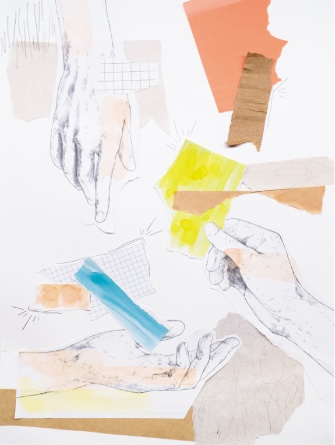

04/ Explore
Trust based on empathy means more than just telling someone your deepest secrets. As we spend more time with people close to us, we gradually open up and build deep relationships we rely on to explore the world from a new perspective. This type of trust instills greater confidence to push beyond our comfort zone through the people we know hold our best interests at heart.

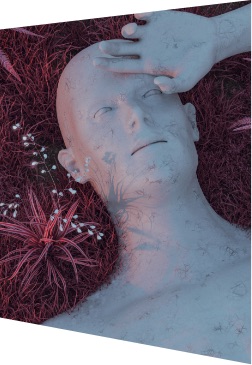
Deliberate Adventure
For Kirk, discovery happens through the circle of trust he slowly builds around himself over time. This circle forms the safety rails that provide him peace of mind to explore the unknown in an unfamiliar country where he barely speaks the language. Within this safe space, individuals he personally connects with prove more influential in nudging his behaviors in particular directions. Which is why he relies only on those he knows to expose him to new experiences and provide advice.
After living in Japan for three years, Kirk turns first to his best friend Hide in order to get suggestions of where to buy a house in the city. Sharing everything, such as hobbies and preferences, but even more personal information such as salary and living habits, Kirk trusts Hide to provide suggestions that better address his needs since they share the same philosophy. So when Hide, who also has a kid, suggests a location based on the great schools nearby, Kirk believes it without a doubt.

Augmented Experiences
When moving into his new house, Kirk augments his living space with technology to digitally stitch his environment together with any other. This allows his house to shrink and grow, sharing the experiences taking place, and overlapping programs as a means by which to create a closer connection between Kirk and his closed circle.
This link is created architecturally, where walls and doorways digitally adapt to resemble certain moments in another house. These moments create shared experiences, such as connecting multiple rooms together to create one large space, while at the same time allowing the ability to retreat back to the personal privacy of a single, disconnected room.
For his son Leo’s birthday party, Kirk connects his physical experiences to his parents’ house in the US. Everyone attending the party in Tokyo shares the time together with Leo’s grandparents, and gets the opportunity to meet his close family through this digital portal. By openly sharing experiences like this with people in a close relationship, Kirk maintains a strong connection even when far away, and gets support in times of need.

Widened Vision
Kirk loves exploring and traveling around Japan with his family. When out driving on a holiday weekend, he automatically shares the journey with his closed circle in real-time through the car he drives and the spaces he interacts with. Because his friends see all his activities, such as where and when he makes a stop for lunch, a notification arrives that informs him of an amazing pudding place nearby that will perfectly fit his craving for dessert. The recommendation comes from Hide, his best friend in Japan, someone who grew up in the area and knows exactly what Kirk enjoys.
When he gets back in the car, the navigation display automatically updates with the suggestion, informing Kirk of how far away the shop is and how visiting it will impact the rest of his schedule. A bit out of the way, the quaint mom and pop shop would have never caught his eye, and the pudding was exactly what he wanted.

Getting uncomfortable is how we learn new things and push beyond our boundaries. This is especially true for Kirk, who lives in a foreign country and still struggles with Japanese and fully understanding everyday situations.
By choosing to build this type of trusted relationship with those close to him, Kirk feels comfortable knowing the decisions he makes and the advice he receives truly hold his best interests at heart. His behavior reflects this change, as full transparency naturally pushes Kirk on new adventures that take him beyond his comfort zone in a safe way, encouraging him to open up more and more.
Only through complete trust and by openly sharing his experiences Kirk achieves this level of connection. While originally hesitant to make such a big change moving to Japan, transparently sharing adventures with his closed circle made him confident to make the transition to a new country but still keep him connected and supported by the people close to him.
Kirk is grateful for his new experiences as openly sharing his travels with the people that know him best opens up opportunities outside his own narrow vision of the world. Through the empathy based trusted relationships, Kirk develops new behaviors and interests previously unknown to him, through playful adventure into the unknown.



In collaboration with IDEO